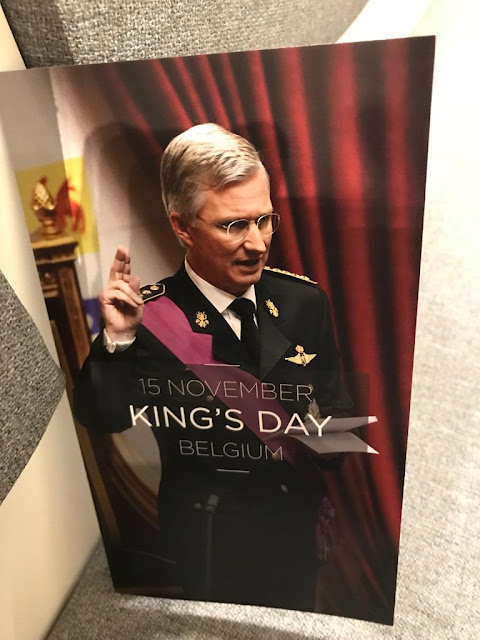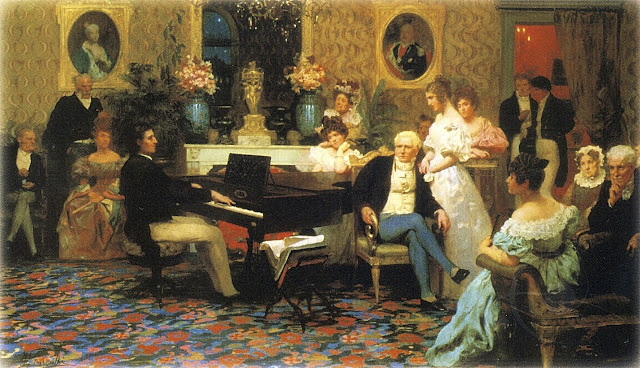King's Day Belgium, 15th November 2021 - A celebratory concert on 17 November 2021, Holy Trinity Church, Warsaw (Kościół Ewangelicko-Augsburski Świętej Trójcy)
 |
| The monumental dome of the Holy Trinity Church, Warsaw (Kościół Ewangelicko-Augsburski Świętej Trójcy) |
I
have many fond memories of this now magnificently restored historic Warsaw
Lutheran church and am quite taken by the connections with Chopin here as a
young boy of 15.
The king's banker, Piotr Tepper, made frustrating efforts to build this church but in 1777 he finally obtained the appropriate privilege from King Stanisław August Poniatowski. The king, however, reserved for himself the right of choosing the design of the building. The church was designed by Szymon Bogumił Zug and constructed from 1777–1782 with a monumental dome and lantern. On 30 December 1781 the congregation's pastor Gottlieb Ringeltaube [de] celebrated the inauguration of the church.
It is a Classical rotunda based partly on the Roman Pantheon. The Lutheran church was the highest and at the same time one of the biggest buildings of 18th century Warsaw. The diameter of the dome is 33.4 meters and the height 58 meters. The church fell into ruin when bombed and burnt by the Germans on September 16, 1939. It was rebuilt after the war. The church continues to dominate the surrounding buildings.
In April 1825, Tsar Alexander I came to Warsaw to open the third Sejm (Parliament) as King of Poland. It was decided that Chopin, as 'the foremost pianist in the town', should give a recital for the Tsar in the Holy Trinity Church, Warsaw (Kościół Ewangelicko-Augsburski Świętej Trójcy) on a curious new instrument known as the Aelomelodikon, designed by Professor Jakub Hoffmann and constructed by Fidelis Brunner. This combination of piano and organ pipes could imitate an orchestra of eighty musicians.
The instrument could possibly have been inspired by a similar combination
harpsichord and organ invented in the 16th century known as a claviorganum
- Bull, Byrd and Gibbons composed for it and Gustav Leonhardt made a
fascinating and successful recording on a copy (Alpha 042). At
all events, Chopin was so successful in this recital and his brilliant
improvisations, Tsar Alexander gave him and Brunner a diamond ring
each! Needless to say the instrument was stillborn and disappeared.
 |
The Young Chopin 1829 Ambroży Mieroszewski (1802–1884) |
In the socially transitional early
1990s some extraordinarily rare musical works were performed in Warsaw, such
was the nationalist excitement following liberation in 1989. This has developed
into a veritable Polish Musical Renaissance in 2021. I experienced some of
these performances.
On one occasion ...
Chopin's second teacher, the neglected Silesian composer Józef Elsner (1769–1854), one of the seminal figures in Polish music, taught him advanced composition, harmony and counterpoint. Chopin was to become the greatest master of counterpoint since Mozart.
Elsner was not a frail little man living in a grubby Warsaw tenement. He founded the Warsaw Conservatorium. Besides symphonies, piano works, quartets, cantatas and a number of masses, Elsner wrote thirty Polish operas and two ballets. An orchestral precursor to Verdi of great musical imagination, Elsner introduced Chopin to the art of bel canto song. Chopin’s early love for the beautiful singer Konstancja Gładkowska flowered alongside his love of the voice, which later developed into a passion for Italian opera, in particular Bellini and Rossini.
Elsner constantly pressed Chopin to compose a ‘patriotic opera’ but failed despite the composer’s enthusiasm for this art. Józef Elsner’s great work, the extraordinary Passio Domini Nostri Jesu Christi, is scored for large forces of musicians including 14 solo voices, three 4-voice choirs, a piano and orchestra, military band and an enlarged percussion section. The autograph of the piece was discovered in the Berlin State Library. ‘The Death of Christ’ and ‘The Earthquake’ are composed in a particularly impressive Sturm und Drang style.
The first complete modern performance was given in March 1999 in the Neoclassical centrally-planned Lutheran Church in Warsaw by Warszawska Opera Kameralna (Warsaw Chamber Opera). The work had an overwhelming impact on me during this performance and increased my respect for Elsner enormously! Elsner was ‘permitted’ to dedicate the work to Tsar Nicholas I who was at that time King of Poland.
On another occasion .....
In 1773 Mozart was asked to supply the incidental music to the play Thamos, König in Ägypten (Thamos, King of Egypt) by Tobias Philipp Baron von Gebler. The play deals with the Masonic conflict between light and darkness.
At Łazienki Park at the Theatre on the Island, in the early 1990s, the Warsaw Chamber Opera, as part of the astounding Mozart Festival, created a staged version of Thamos fused with the music of two later Masonic cantatas. During this festival, the company mounted all twenty-one operatic works of Mozart. The experience of Thamos in the park has remained one of the greatest of my entire musical life.
Shortly before midnight fluttering funeral candles were lit along the
sinuous paths leading to the theatre from
the entrance to the park. The
orchestral pit lies before a strip of water which isolates the Theatre on the
Island (inspired by the ruins of the Temple of Jove at Baalbek in Syria), where
the actors perform, from the
amphitheater (modeled on ruins at Herculaneum) where the audience is seated.
Trees were silhouetted against a fading summer sky and the leaves rustled in the light breeze moving over the
shattered columns and pediments, the lake a dull mirror
reflecting statues of the dying Gaul and Cleopatra. Together with the cry of
peacocks on the balustrades of the palace, one was lifted onto a plane of rare
classical beauty.
On one occasion it rained
heavily and the entire musical side of the production was transferred to the Holy
Trinity Church, Warsaw (Kościół Ewangelicko-Augsburski Świętej Trójcy).
Incredibly the church was opened up at 12 midnight and the performance
continued until 2.00am. Something unheard of in a city like London! The Artistic Director of the day Stefan Sutkowski, was a musical institution himself with enormous influence in the world of musical culture in Warsaw.
 |
| Philippe, King of Belgium |
Photographs below by Filip Błażejowski
P.S. It's All Music
 |
| HE the Ambassador of Belgium to Poland and Lithuania Mr. Luc Jacobs |
The program was
devoted to original compositions and arrangements by the
Belgian composer Piet Swerts on the piano and the Ataneres String Ensemble
formed in 2017. The ensemble performs works in a wide range of modern
and classical genres. They have won many awards under the Artistic Direction of
Wim Spaepen.
Swerts is very active internationally as a composer and since 1985 has been conducting and composing exclusively in all genres. He has written more than six piano concertos, a violin concerto, five major oratorios, three symphonies, two operas and a great deal of chamber music as well as iconic pieces for saxophone. He also teaches composition and orchestration.
The arrangement of the Chopin Nocturne in C sharp minor Lento con gran espressione was suddenly deeply familiar music (especially the immortal melancholy of the theme on viola). I am always surprised that Chopin wrote this work at a relatively young age, yet the melody of the work is full of intense intimations of deepest disillusionment. Similarly moving was the sublime melody of Debussy's Clair de Lune arranged for strings and piano. The Sonata No.17 Grief was what one might term 'sweetly dark', never falling into the deepest despair, which we strive to avoid if at all possible in reversed circumstances in life.
The Eric Satie Gymnopedie No.1 was just as charming here as whenever I hear it - immortal simplicity in this melody. The music of Eric Satie has had a rather unacknowledged influence on French music. A wonderful eccentric was Satie, who had an obsessive desire to collect umbrellas! He had hundreds of them.
The Antonio Soler Fandango lifted our spirits, but I suggest you hear the full long version on the harpsichord. It is a phenomenal and magnificent work on the instrument for which it was intended. Try the exuberant Variaciones Del Fandango Espanol on Teldec played by Andreas Staier. The final work Drive Extended was a similarly energetic work to round of an evening of reflective music played with exemplary style and professionalism.
Perhaps needless to say, a standing ovation concluded the concert.
 |
| HE Ambassador Luc Jacobs presenting a Belgian Days Programme to Piet Swerts |









Comments
Post a Comment